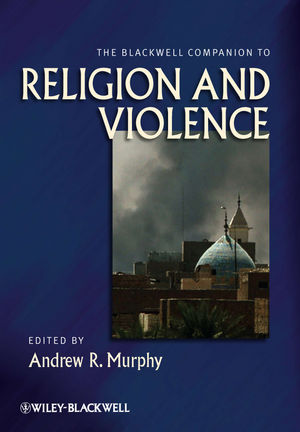The Blackwell Companion to Religion and ViolenceISBN: 978-1-4051-9131-9
Hardcover
632 pages
May 2011, Wiley-Blackwell
 |
||||||
“To conclude, this survey of The Blackwell Companion to Religion and Violence indicates its breadth, and thus its value to those studying the religious ethics of violence and peace, and to those studying violence and peace in other disciplines ... The Companion will spur advanced students and academics to explore methodologies and historical-cultural examples with which they were only passingly familiar.” (Studies in Christian Ethics, 1 May 2013)
"This is an important reference work ... Highly recommended: upper-level graduates and above." (Choice, 1 December 2011)"This is a fascinating and enlightening book." (New Directions, 1 November 2011)
"Very impressive ... The contributors write from a variety of perspectives - sociological, anthropological, historical, economic - and cover between them a wide range of religious traditions ... Taken together, the chapters in this Companion show how different forms of religious faith (including Christianity) can be distorted, and then inspire acts of brutality and violence ... An indispensable tool for anyone seeking to bring clarity rather than rhetoric to this murky area." (Church Times, 21 October 2011)
"A curious and voracious reader of the (mostly accessible) essays found in The Blackwell Companion to Religion and Violence will learn a great deal about religion in its various cultural, economic, political and social manifestations, especially as these are related to violence." (The Tablet, 1 October 2011)
"The Blackwell Companion to Religion and Violence is a landmark volume, finely structured and beautifully executed. The essays in this outstanding collection bring much-needed precision to the discussion of religion and violence and prompt a multitude of questions about how and why we study it. The geographic framework is wonderfully expansive – there are detailed studies of cultures from throughout the world – and the disciplinary breadth is unparalleled in any recent reference work on religion. The most striking aspect of this volume, however, is the reflexivity that it brings to the study of religion and violence. In clear and engaging prose, these essays, taken together, challenge pat understandings of the topic by daring the reader to rethink the point of studying it. The collection amply and enviably demonstrates how strong editorial direction, which is lacking in many similar volumes, is crucial to shaping a book that is both scholarly and accessible to a broad readership."—John Corrigan, Lucius Moody Bristol Distinguished Professor, Florida State University



